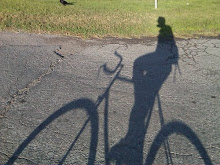The round trip is a total of 1046 miles and by taking the bus I expect to save about $25 in gas compared to the cost of the bus ticket. Of course the travel time almost doubles when taking the bus vs. a car, but then again my time is cheap since I have no real marketable skills.
So other than money, what can I expect to be saving (and the answer is certainly not my dignity)? As you can see by the chart below, a 3/4 full Transit Bus - intercity - produces approximately .2 Ibs of CO2 per passenger mile vs. approximately 1.2 Ibs of CO2 per passenger mile in a single occupancy vehicle (SOV).

Over 1046 miles my share of the CO2 produced adds up to 209.2 Ibs of CO2 for the bus vs. 1255.2 Ibs of CO2 for a car. So on the bus, my trip should produce only about 16% of the GHGs of an equivalent car trip.
Plus... there is the added bonus of not having to worry about getting a speeding ticket. That should be the only arguement anyone needs to hear to convince them that the only way to travel... is by bus.





8 comments:
On the one hand, I applaud your taking a sensible mode of transport on such a long trip.
On the other.... wow, that's a lot of analysis!
Taking a bus is the second worst way to travel.
Walking is the worst.
[ketrazi]
ChipSeal... thanks for bringing Rantwicks little idea over here.
[ketrazi]
I agree that taking a bus over long distances really sucks... and this coming from someone that is advocating for alternative transportation.
But there is little choice when it comes travel in and around Montana. To catch a train, its about three hours away and even then its at an extremely inconvenient time.
So to get outside Missoula you have the choice of a car, the bus, or a plane. The plane is expensive since Missoula has so little service, but its fast. The bus is cheap but slow and inconvenient.
There certainly is demand for bus service - the bus going east was about 90% full - and better more timely and convenient schedules would make the bus a more competeitive alternative.
Is that graph taking infrastructure into account?
Thanks Tracy for the thoughful comment.
I highly doubt there is any infrastructure taken into account.
Such an analysis adds a lot of extra work and complicated factors into the mix.
I'm not sure how you would split infrastructure costs across modes; since roads are used by more than just cars (cars, buses, bicycles) figuring out the split would be difficult and up for criticism.
As for infrastructure in general... from all the research I've seen, roads are the most expensive on a per mile basis when lifetime costs are taken into account. A rail-line is pretty damn expensive too, but once its in the maintanence costs aren't that bad compared to roads, which need to be basicaly replaced at least once every 7-10 years. And with roads, the logistics aren't the only thing using fossil fuels, the actual road surface uses a lot of oil resources.
Something is wrong here: why the statistics says "Amtrak" and that their trains are more polluent that a bus? A train with 200 passengers more polluent than a bus with 50 or less? Give me a break! And electric trains (rail transit) more polluent than a bus? Look for another graphic or do some investigation...
I think that this graphic was done for an study payed by... the bus industry, so it is easy to see how they manipulated the numbers to show buses as the cleanest mean of transport... that, of course, they aren´t.
Since there have been questions raised about the study I pulled the graph from. For those interested and still concerned about this issue, please take a look at the citations and methodology provided by Sightline Institute.
http://daily.sightline.org/daily_score/archive/2008/02/08/planes-trains-and-automobiles
Post a Comment